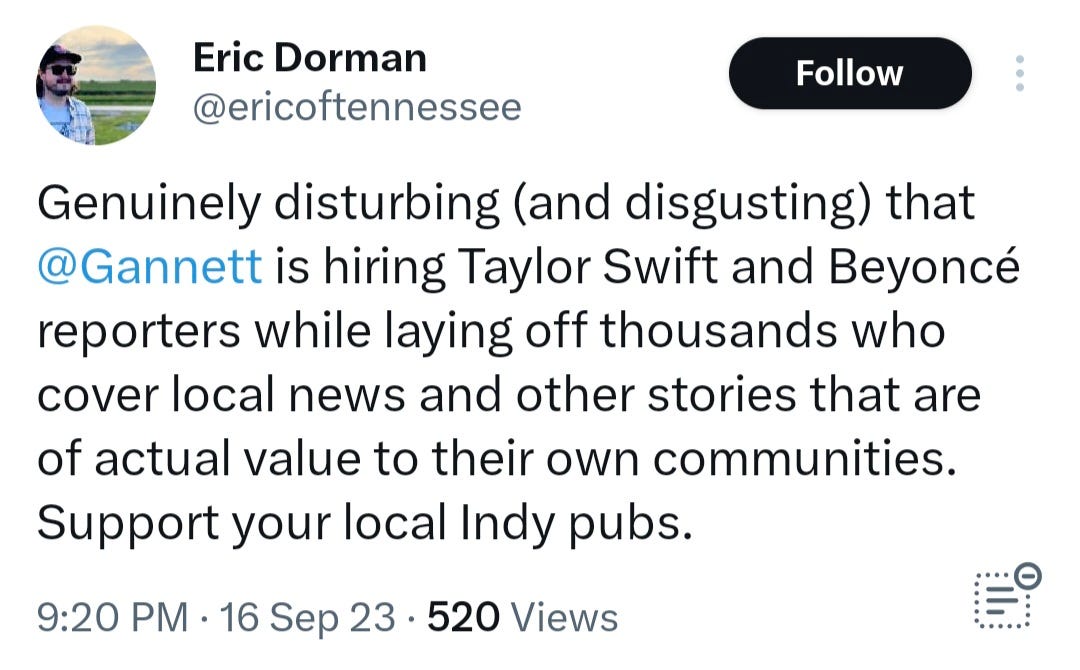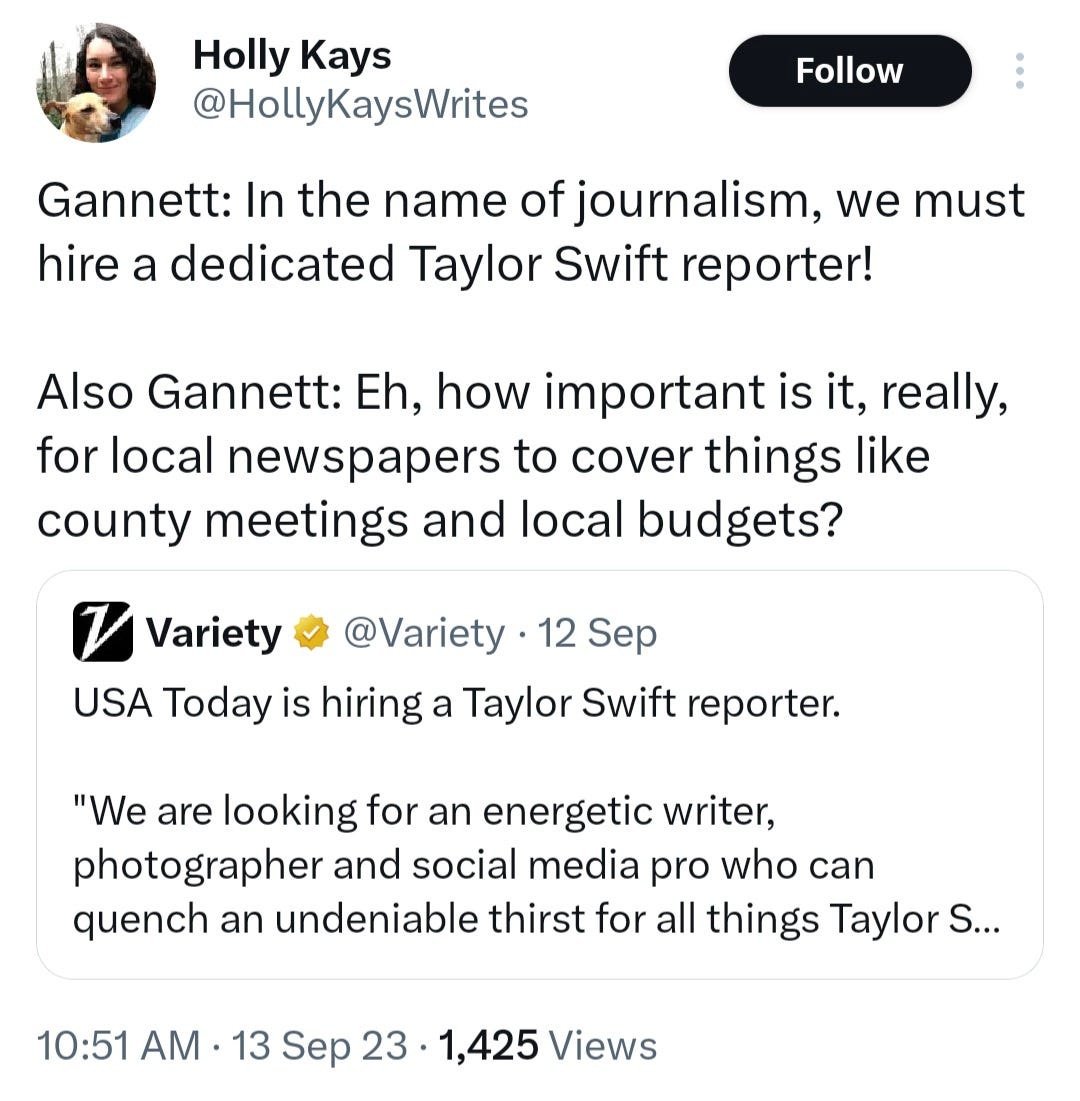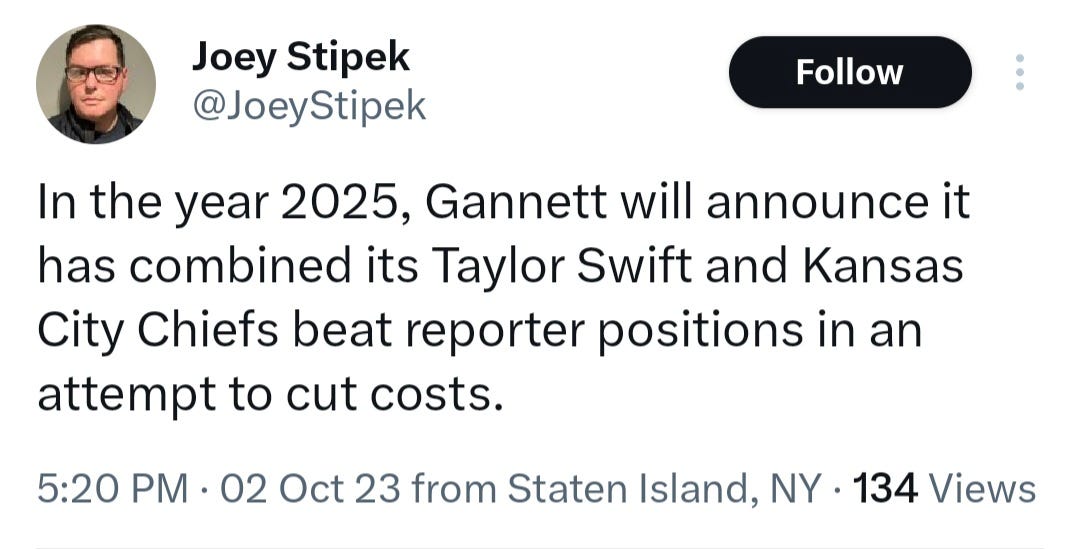Media observer defends Gannett's Taylor Swift, Beyoncé reporters hiring
But he says 'it's absolutely absurd hyperbole' to claim it would save local news

Controversial, but a media observer has come to Gannett’s defense for its move to hire Taylor Swift and Beyoncé reporters.
Because these pop icons are powerful figures, watchdogs are needed, he said. He also called for a broader conversation around saving local journalism, which should encompass more than just traditional hard news coverage.
Gannett, which operates more than 200 daily papers nationwide, made headlines last month for its openings of beat reporting roles for the two artists out of its Nashville-based newspaper, The Tennessean.
The move generated a wave of backlash from journalists along with nearly 1,000 applications from a diverse pool within two weeks.
The USA TODAY’s parent company told The Wall Street Journal the decision was in the spirit of saving local news. However, it came against the backdrop of the company’s layoff of roughly 600 employees last year.
The measure affected newsrooms across the country. To put that in perspective, a Gannett newspaper in Springfield, Illinois, was, at one point, being led by the editor of a paper in Lakeland, Florida, about 1,000 miles away, according to NPR.
“I think it's absolutely absurd hyperbole to say that, they're going to save local journalism by creating two jobs after cutting hundreds in recent years,” said Jon Allsop, a UK-based freelance journalist.
He aligned with the backlash in that aspect. And to be fair with Gannett, the company told The Journal it has hired 260 journalists since a new chief content officer took over in March and is filling more than 100 open roles.
Where Allsop diverged from the social media criticism was in the assertion that these positions are "trivial," in the sense that they focus on "people who are popular with teenagers" rather than the more "serious business of governments."
Allsop, who writes for Columbia Journalism Review, said that perspective represents a “very narrowed, traditional” view of what constitutes the power that journalists should be scrutinizing.
“I think journalists' job, among other things, is to hold powerful people to account or to interrogate the ways in which power is exercised,” he said. “Taylor Swift (and) Beyoncé are immensely powerful. It’s just a sort of soft power. It’s not institutionalized, but it’s in a political sense anyway.”
When Beyoncé was on her tour in Sweden, she was attributed for the impact of the country’s inflation rate.
For Swift, the ticket sales for her recent tour led Congress to hold a hearing on consolidation in the ticketing industry. Most recently, her Instagram post was reported to have driven a surge in voter registration.
“Clearly, I mean if that’s not power, I don’t know what is,” Allsop said. “I just disagreed with the premise that these people are not worthy of coverage or having their own” beat reporters.
Meanwhile, media economist Spencer Grimes said if Gannett can find enough relevant content on the two artists to hire dedicated reporters, “I say go for it.”
But he doubted it. He questioned whether there is a nationwide market for Swift and Beyoncé beyond major cities like Nashville, Los Angeles and New York.
“I mean, how are they going to report on private citizens on a regular basis?” Grimes said. “I don’t why wouldn’t they just capture it under the general music and entertainment journalist.”
Asked what kind of stories to expect from these beat reporters, Allsop said the language in the job postings suggested that Gannett intended for these reporters to produce “thoughtful, analysis pieces about the cultural impacts.”
While a few stories that try to capitalize on trends to get clicks are expected, Allsop cautioned against rushing to judgment. He said there are various ways to do that without hiring dedicated beat reporters at up to $50.87 an hour.
“This is Gannett, so you know a record of doing some really good journalism and a record of cutting a lot of really good journalism,” he said. “I think the jury is out a little bit on how these reporters will actually do. We'll have to wait and see.”
‘This is how we save local journalism’
By Gannett’s logic, according to what Chief Content Officer Kristin Roberts told The Journal, these beat reporting roles are expected to bring in more revenue, which means more funding for the business as a whole — including local newsrooms.
Roberts said if the roles are successful, the company may create more dedicated jobs to cover certain personalities or topics.
Gannett ended the second quarter of the year with 1.95 million digital-only subscriptions, up 4.6% from the same period last year but down from 2.03 million last quarter.
The company’s revenues from such subscriptions grew 16.6% year-over-year, prompting it to raise its full-year profit outlook.
Remaining skeptical, Grimes said while Gannett may be able to sell more subscriptions, he didn’t believe the move would be “transformative” for local news. He said she only appeals to a relatively small segment of the population.
“And frankly, her core demographic … are not subscribers to the local newspaper,” he added.
When Grimes thought of local news, he said he wanted more truly local stories and he didn’t see how Swift fits into that category. He pointed out the local sports and government coverage at his home in New Canaan, Connecticut, by Hearst.
“I think that's where local newspaper publishers have to focus their resources, not on a national entertainment story like Taylor Swift,” Grimes said.
Allsop reiterated that journalism encompasses a much broader spectrum than just hard news because people live their lives interested in all sorts of things.
He said it’s “a real shame” if journalists think covering anything outside of hard news is indulgent and is not journalism that’s worth saving.
“There should be room in the media landscape for a wide range of interests and subjects to be represented without people sort of sneering at some of them as being soft or trivial,” Allsop said.
Disclosure: I worked at Hearst Connecticut.
What I’m reading:
Journalists rush into danger to cover the Israel-Hamas war — Poynter
Politicians say this Florida news site lets them buy coverage. Is your state next? — NPR
Here’s what the Washington Post job cuts will look like — The Daily Beast
News story or meme? After Elon Musk aXes headlines, it’s hard to tell — Nieman Lab








